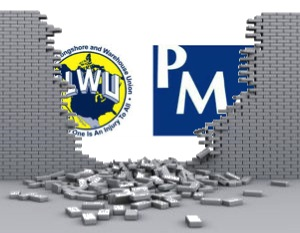 All this West Coast labor contract ugliness is almost behind us. Maybe.
All this West Coast labor contract ugliness is almost behind us. Maybe.
Last week, the International Longshore & Warehouse Union (ILWU) held a Coast Longshore Caucus in San Francisco with 90 delegates reviewing the tentative agreement that was reached February 20th between the ILWU and Pacific Maritime Association (PMA).
After going through the proposed agreement line-by-line, the delegates voted by 78% to recommend it to the rank and file, according to an ILWU release.
Now, copies of the agreement get sent to the rank and file union members, who will discuss the possible new contract at local union meetings. The delegates from the Coast Longshore Caucus are expected to be involved in these local union discussions. Then the union will hold a secret ballot vote on the ratification of the tentative agreement into contract.
“This agreement required ten months of negotiations – the longest in recent history,” said ILWU International President Bob McEllrath, “but we secured a tentative agreement to maintain good jobs for dockworkers, families and communities from San Diego to Bellingham. Longshore men and women on the docks will now have the final and most important say in the process.”
The length of the contract negotiations, mentioned by ILWU President Bob McEllrath in the ILWU press release excerpt above, was certainly felt by shippers. Port congestion reached unbearable levels as the ILWU orchestrated slowdowns and the PMA effected mini lockouts by the end of the contentious negotiations.
By the time the rank and file union members have their “final and most important say in the process”, it will have taken over a year to reach a new contract between the ILWU and PMA.
Here’s a quick timeline of these contract negotiations:
- MAY 12th, 2014 – Contract Talks Begin
- JULY 1st, 2014 – ILWU Contract Expires
- FEBRUARY 20th, 2015 – Tentative Agreement Reached
- APRIL 3rd, 2015 – Delegates Vote to Recommend Agreement
- MAY 22nd, 2015 – Final Tally of Union Vote to Ratify or Reject Contract
Thankfully, since the end of the negotiations, port productivity at West Coast ports has increased and progress has been made in clearing the backlog of cargo containers at the ports.
While it is expected that the union will ratify the tentative agreement, there are those within the union who are against it.
We already posted an article in Universal Cargo Management’s blog about a militant ILWU faction that opposes ratification of the new contract. That group, the Transport Workers Solidarity Committee, held a rally in San Francisco during the Coast Longshore Caucus to speak against the tentative agreement.
“Left unchecked, it will gut ILWU’s coast-wide power and bury the last militant union in the U.S.,” the Transport Workers Solidarity Committee says about the contract on their webpage promoting the March 31st rally.
SocialistWorker.org posted an article on how the new agreement will weaken the ILWU if it is ratified. Here’s a highlight from that article:
The details of the agreement are still being analyzed and discussed by ILWU members, but if the outlines that have emerged so far are correct, the leaders of the union came up short in critical areas. There are definite or possible concessions on arbitration and outsourcing that put future union jobs at risk, and no apparent progress in dealing with the shipping bosses’ use of new technology to undermine union power.
Overall, the [tentative agreement] appears to continue a pattern for the ILWU leadership: Accept wage and benefit increases for current members at the expense of concessions that will undermine conditions for future dockworkers.
It seems to me that union actions to orchestrate slowdowns at the ports is a much bigger case of putting pressure on the PMA to get wage and benefit increases now at the expense of undermining future dockworker jobs.
With strikes and slowdowns, the ILWU has the ability to basically hold West Coast ports hostage in order to increase their negotiation leverage. When this happens, shippers suffer. Imports don’t arrive that are needed for production or store shelves. Exports don’t get out, which undermines foreign business partnerships.
After the last year of congestion being aggravated to extremely costly levels, many shippers have lost trust in West Coast ports and are taking their cargo elsewhere when possible.
The results are losses to the economy and endangered jobs not just outside the docks, but for would-be future dockworkers.
If the rank and file of the union votes against ratifying the tentative agreement, this whole ugly process drags on. Luckily, that is not expected to happen, especially now that the ILWU delegates have voted to move forward with a recommendation of the agreement.
